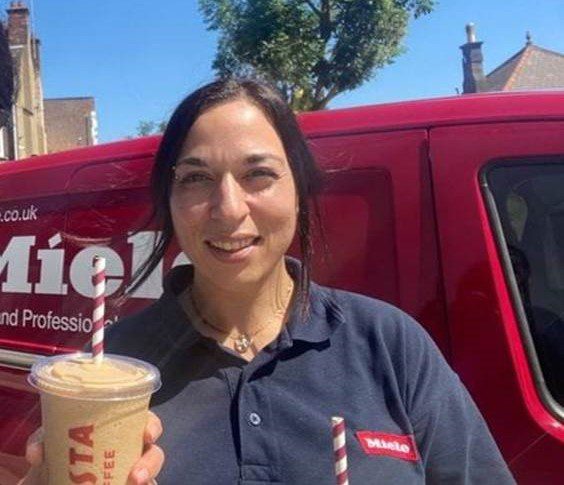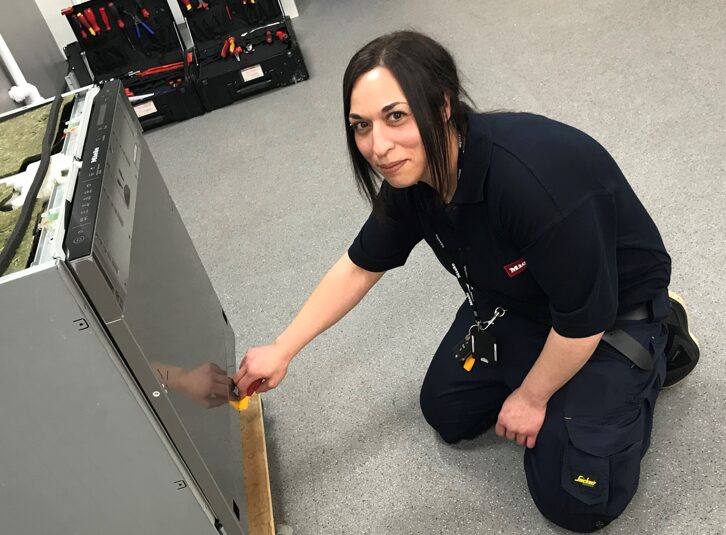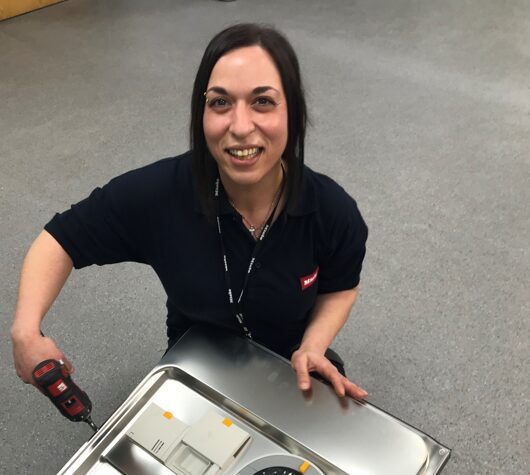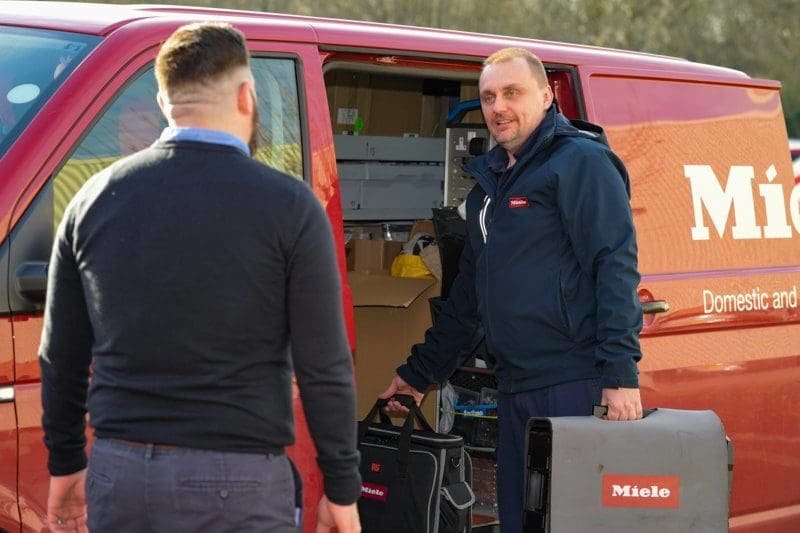Field Service Technician for Miele
Emily Miltiadou, Miele, UK
Emily Miltiadou has a background in transport and consumer products. For the last ten years she has worked for Miele as a Field Service Technician.
Emily is based in London and is fluent in English and Greek.
In this article she shares her experience and story.


Background
Have you always been interested in how things work and how to repair them?
When I was in school, I didn’t want to work in engineering but wanted to be a lawyer. After work experience in a solicitor’s firm, and having to type affidavits all day, I completely changed my mind.
I definitely didn’t want to do an office job.
Since childhood, I have had a technical and inquiring attitude to problem solving. I have always tried to repair anything that stops working. My dad was an engineer. (I used to make him give me his old tools when I saw he had doubles). When I got my first car, I decided to wire up the radio with the use of a multimeter, and my father’s help, and decided I liked electronics.
So, I went to college to study engineering. I was quite shocked that I was the only female on the course, but this did not bother me. I excelled and was one of the best students in my class.
On the last year of the course, I was selected to go to Salford University on a course to encourage women into engineering. I met lots of women from around the country that were in the same boat as me. On the course, we had the chance to try many aspects of engineering, including working on aeroplanes. I will never forget when we were shown how to fix the wing of a Boeing 747.
Inspirations
Did you help with anything practical when you were a child?
As a child I used to love watching my father repair things around the home. On occasion he would let me get my hands on too and I used to love it. Especially when we finished, and it would work again.
Has there been a particular person who has been an inspiration or mentor to you? (e.g. someone famous, or at school, family member..)
My father of course.
While you were at school, were there any visits which helped you to decide to work in engineering?
The course at Salford university was a definite help.
You are fluent in two languages; do you think that this has helped you to be a better communicator overall and so ideally suited for field engineering?
Working as a Field Engineer, or Field Service Technician, you go to many homes where people do not speak English. Whenever I visit a Greek person, who struggles to speak English they will explain the issue in Greek, which helps.
On other occasions I call a colleague who can speak the customer’s language. I give the phone to the customer, and afterwards my colleague explains to me what the customer was saying.
There are now other ways. When I started engineering, mobiles where just being introduced. Now we all have internet wherever we go. So nowadays I use google translate on my mobile when I do not speak the language. So, I don’t think speaking more than one language is necessary, but it does help me understand people who are struggling with English.


Technical experience
You worked for Transport for London as an electrician for buses. What did the work involve?
The work involved:
Bus type knowledge.
Radio software replacement and testing.
Radio ID, code plug and route programming.
AVL unit programming.
RF and VSWR testing.
Bus installation wiring.
Fault finding on FAVL equipment.
BLEC camera bus interface equipment.
Fault finding on Band 3 radio equipment including Storno and Tait.
Commissioning and testing Band 3 radios and FAVL equipment.
I would test and repair ancillary items such as microphones, speakers, foot switches and associated cablings. As well, I would work on trunked two-way communication radio, transponder/beacon based and automatic vehicle location systems.
I was also selected and trained on installing trackers in vans.
How did you manage being the only woman on the team?
It wasn’t an issue as from college I had been the only woman on the team. If anything, I was at a bit of an advantage, as colleagues would support me when needed. All the garage controllers and engineers knew me and had a lot of respect for me.
Transferable skills
What skills did you take from the transport industry to the consumer industry?
Communication skills was one of the main skills. Also, fault finding and the use of electrical meters and tools.
In your opinion, can someone skilled move between industries easily as long as there is some training?
Yes, definitely.
I started off as an on bench mobile phone technician, soldering and repairing mobile phones. From here I moved to working on buses, where again full training was given. I keep transferring and gaining new skills on each job.
Now I am in a completely different industry, as a Field Service Technician, working in consumer’s homes and repairing white goods.
I have had full training in each job and been successful in completely different industries.
Women in engineering
You have many years of experience as the only woman in a field engineering team. How do you deal with prejudice? Can you give some examples?
I had no prejudice repairing mobile phones or working for TFL. These were not customer facing environments. The prejudice I did have was when I started repairing white goods. This was not from males, but from the older generation! They didn’t understand why I, a woman, was turning up to fix their appliance.
Example
For example, I had one woman cancel the visit after I had called her to tell her I was on route. She thought I would not be capable of uninstalling her washing machine. This was even after explaining, I had all the relevant training and would not have been sent if I was not capable.
Example
Another incident was when I had a service call out to another couple who had reported their appliance for no power. I rang the bell and was greeted with:
“Oh no!”
“What’s the matter?” I asked.
The response was:
“I don’t know how you will take this machine out. We have been trying but can’t get it out, and you’re a woman!!”.
I replied with:
“Don’t worry I have had all the relevant training.”
They were so impressed when I took it out, repaired it, then reinstalled it, that to this day they refuse to have anyone else attend to fix their appliance.
Example
My grandfather also didn’t like the fact that I was doing a so called “man’s job”. He thought I should work in a more so-called “feminine job”. We used to disagree with my job choices all the time.
Then one day his washing machine broke. My father asked me if I could go and have a look.
After that, my grandfather’s attitude changed, and he told everyone:
“My granddaughter is the best engineer”.
This was one of my proudest moments, and I will never forget it.
What advice would you give to other women working in a team as the only woman?
You don’t have to worry if you are the only woman. You will be welcomed into any team. The men will respect you. Things are a lot different now, to when I started doing engineering. More and more women are realising they can do anything they want.
How can more women be attracted to science, engineering and technical roles?
In my opinion more courses like the one I did at Salford University to encourage women into engineering.


Typical Week as a Field Service Technician
Is there a pattern to the week, or is every week different?
You are allocated jobs, and travel to customer premises. Some weeks there is more driving involved and fewer jobs. Other times if the jobs are quite close to each other you will have time to complete more jobs.
You are allocated what can be done within your shift but can always choose to take on extra jobs if you like.
How much of the time are you out making service calls?
On average it takes 60 minutes to complete a service call.
How much driving do you do – how many hours on the road?
This will vary depending on where the jobs are.
What sort of engineering work do you do?
I have been a field service technician for Miele for the past 10 years. I service and repair a wide range of domestic and some professional appliances in customers’ homes. This includes maintenance, fault diagnosis, repair, and electrical testing.
Typical Day
Can you give an example of a typical day?
A typical day will be, checking deliveries first thing in the morning. (As we get deliveries into our vans the night before to have parts to fix the appliances).
Next, contacting customers to advise that we are en route with an eta.
After that:
Attending the customer, diagnosing, and repairing the appliance.
Advising on how they can prolong the life of their appliance with care products.
Completing a report, then repeating for the next job.
Do you always work alone or sometimes in a pair?
There are certain jobs which you need to do as a pair. This is when an installation is not straight forward, e.g. a machine stacked in a cupboard. On these occasions, due to our manual handling training and risk assessment you will require a second person to assist to uninstall the appliance.
Physical fitness
How much is physical fitness important for what you do?
My job is very physical. We carry tools, have a lot of stairs to walk up to reach appliances in customer premises.
Is lifting and carrying easy for anyone with the proper training?
Yes. People have the misconception that you are lifting appliances.
It’s not strength, it’s technique.
Manual handling training is the best way to learn to do this safely and without straining yourself.
How do you personally stay fit?
I regularly go for long walks with my fiancé.
Types of equipment
What type of equipment do you work on?
I service and repair white goods. This includes, washing machines, tumble dryers, dishwashers, coffee machines, steamers, refrigeration, ovens, and warming drawers.
What is your favourite piece of equipment to repair?
Washing machines. This is mainly due to seeing customers’ faces when they see I can uninstall and repair them.
Which is the most challenging and why?
Tumble dryers, due to them rarely being installed on the floor. They are always stacked, or at the top of the house.
Training
You’ve been working for Miele for 10 years. What sort of training did you have at the beginning?
Manual handling and full product training before being sent out in the field. Then you will have a mentor shadow you to ensure you are ready to go out alone. You will not be sent out to work alone until you are ready.
How quickly did you learn all the pieces of equipment?
Very quickly, as I had come from a background of using power meters.
What sort of ongoing training is available?
There is update training when a new product is out. You can also complete the course again online. If you are struggling, it’s not a problem to ask for help or to repeat the course. You can have a chief technician come out with you also if it’s a particular job you are struggling on. You are never alone. Support is always there if needed. You just need to ask.
Who do you go to within the company for support or advice?
There is a technical help line, run by technicians, so if you are struggling you can call this for help. There are different teams in London, and they all have their own senior technician. So, you can always call your senior technician for support. On other occasions, you could just call a colleague who may have faced an issue you have not yet seen. Each team also has its own WhatsApp group, so you can post a question on there. Someone will know the answer and get back to you.
Challenges of the job
What are the challenges of the job?
One challenge you do find is trying to locate a property with just a house name and no door number. Another one is the way the roads are constantly changing in London and becoming pedestrianised. We are given folding trolleys so if we cannot park in front of the property, we can always put our tools on a trolley, and make our way to the customer’s property.
Positives of the job
What are the positives of your role?
The feedback you receive from customers. Knowing you have repaired the appliance, rewards and recognition schemes.
Why would you recommend working as a Field Service Technician? to other people?
You feel a great sense of accomplishment when you repair an appliance.
What sort of people are ideal for this work?
You must have a good understanding of fault finding, using tools and power meters. You must be logical and have common sense. There are a lot of machines you attend, where there is not actually anything wrong with the appliance. People just don’t read manuals or know how to use them.
You already had experience in domestic appliances. Could other types of experience transfer into Miele?
You can easily transfer to be a Field Service Technician, if you are logical, know how to use tools and test equipment, and have good communication skills.


People skills
What advice would you give to engineers who have to work while someone is chatting to them/asking questions?
Everyone is different.
Some people can work whilst communicating. This is what I do. If it is a difficult issue where you need to focus only on that, just be honest. Explain to the consumer that you need to concentrate to repair the appliance, and you can’t talk until the repair is complete. They won’t get offended. At the end of the day, you have attended to complete a repair not to chat. They are always grateful when their appliance is working.
What do you do if a customer asks you to look at a different piece of equipment as well?
If it is a Miele appliance, and I have time I will call my planners to add it as an extra job. However, if I don’t have time, I will still get it booked in for them by calling my planners. If it’s not Miele, I will advise them to contact the relevant manufacturer or their insurance.
How can customers help you – other than by offering you a cup of tea? 😊
Explain the issue. I have attended many calls with multiple visits where nobody has asked the end user what the actual problem they are having is.
Teams
How do you feel part of a team when you are working out in the field for most of the time?
We call each other, either for advice or just to have a chat. We have Field Service Technician team meetings and a WhatsApp group.
How do you balance the lonely side of the job?
There isn’t really a lonely side. You are either with customers or driving to another job. If you ever feel lonely you can call a colleague for a chat.
Further reading
Natalie Aixill, Technical Services Engineer, Evora Edge
International Women in Engineering Day 2023
International Women’s Day – some of our women members share tips and advice for Women in Field Engineering


Responses